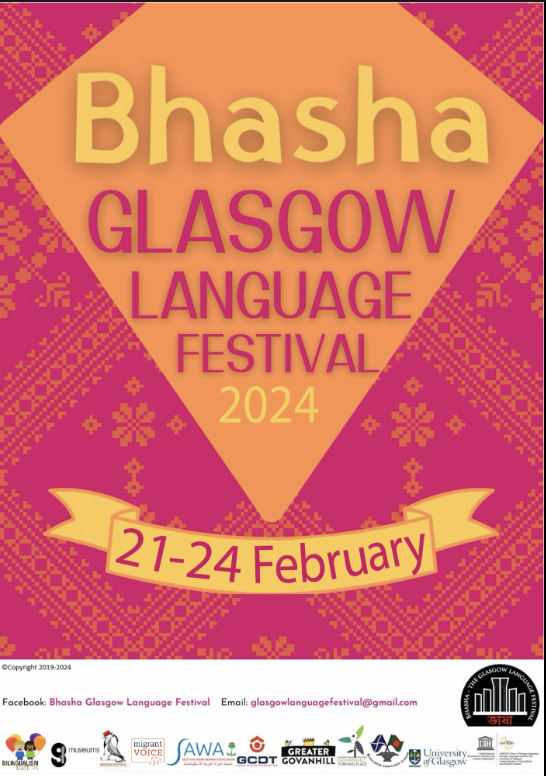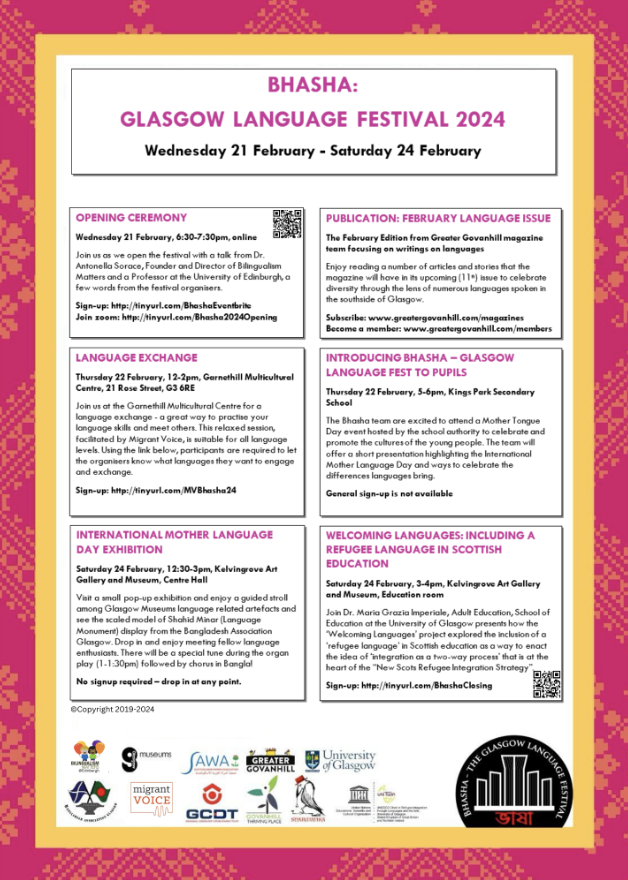Our Gift to Glasgow: Celebrating Mother Language Day
In this piece, Bangladesh Association Glasgow, the team behind BHASHA – Glasgow's Language Festival, tells us more about the roots of the festival. A vibrant celebration of linguistic diversity, inspired by the fight for Bangla preservation.
Organisers meeting for the first Bhasha Festival
Words by Altaf Hossain Russell & Dr Saif Khan | Photos by Bangladesh Association Glasgow
In political science, language is known to be an essential element in nation building, as it is inextricably linked with a person’s psyche. This, in extension, moulds the culture and ethnicity of a nation.
When the father of Pakistan, Mohammad Ali Jinnah, announced in March 1948 that Urdu would be the sole state language of Pakistan, it is not surprising that discontent engulfed the majority Bangla-speaking people of what was then East Pakistan.
In the face of these tensions the government outlawed public meetings and rallies, but on 21 February 1952, intellectuals, students and people of all walks of life came out on the streets of Dhaka to protest – waking up in a common spirit to protest the right to their language.
The names of Salam, Barkat, Shafiur, and teenager Oliullah are but a few of innumerable numbers, who lost their lives on that day, when armed forces opened fire on processions for recognition of Bangla as the national language. The movement continued for several years until finally, in 1956, the government of Pakistan was forced to grant Bangla the status of the state language.
Since then, Bengalis have commemorated 21 February as Amor Ekushey or Bhasha Shahid Dibosh – Language Martyrs' Day. This date was adopted as International Mother Language Day by UNESCO in 1999, and since then it has been recognised worldwide.
That event in 1952 fundamentally challenged the imperialist concept of nations defined by religion. Eventually, in 1971, Bangladesh emerged from East Pakistan as an independent nation under the leadership of Bangabandhu Sheikh Mujibur Rahman. It established that in some societies, cultural and ethnic identity is stronger than other identities.
Attendees at the second festival held at St Mungo Museum of Religion
In an increasingly globalised world with economic expansionism dictating everything, including how we speak, the need to have somewhere we can all celebrate our differences linguistically drove Bangladesh Association Glasgow (BAG) to create BHASHA (meaning language in Bangla) – the Glasgow Language Festival.
The then BAG, President Saif Khan, GS Nasiruddin, Vice-President the late Mrs Mridula Nasreen Sarwar, and Cultural Secretary Mrs Anindita Huq worked tirelessly to create a platform of like-minded people, organisations, and the linguistic community of Scotland for the continuation of the festival in the future. This came to fruition in 2019 when the first festival was held.
Working with the Glasgow City Council Open Museum, a plan was made for a day-long festival in the Mitchell Library which would include a mixture of talks on various aspects of language and linguistics, interspersed with language-related entertainment. There was a display of books, leaflets, and flyers from organisations that work with language in Scotland.
Professor Alison Phipps, UNESCO Chair in Refugee Integration through Languages and the Arts, who became a patron of the festival, came up with the motto of ‘BHASHA: Our Gift to Glasgow’. It brings all the different language speakers of Glasgow together as an expression of our legacy and a way of saying thanks to our adopted homeland.
In that first festival, a video of Shakespeare’s Romeo and Juliet performed entirely by disabled theatre artists in Bangladesh was premiered. British Sign Language interpreters conveyed the whole festival to the audience. The BAG theatre team retold a famous historical drama on the killings of language martyrs called ‘Kobor’ (the Grave) written by Munir Choudhury. BAG trustee Tareq Abdullah penned a new drama based upon the original and called it ‘Kobor: Otohpor’ (the Grave: After). It was a very emotive presentation. Since that successful first festival day, BHASHA has not looked back.
In 2020 BHASHA was arranged by Our Shared Cultural Heritage along with Open Museum and BAG partners on the premises of St. Mungo Museum of Religious Life and art history. A much smaller event than the previous year, it was attended by the Asst. High Commissioner of Bangladesh. It was a multi-lingual cultural event featuring, songs, drama, storytelling, poetry recitation and food from all over the world.
Despite the pandemic rampant in 2021, a new organisation called the Thriving Places Govanhill stepped forward to arrange the festival with help from BAG, Bilingualism Matters, Greater Govanhill and the Open Museum team. This was the first time the festival was held for a week. Marzana Antoniak and Marrion Eele of Thriving Places made a stellar effort to create a festival with daily polyglot sessions, street arts with stencils. For the first time, a BHASHA Facebook page was also created. Also, a display of language-related artefacts was shown for the first time that year.
The replica was displayed in the museum foyer with our children explaining the event to the present audience. The famous hymn commemorating the martyrs was sung on the day for the first time in the festival. Arabic dance classes and multi-lingual poetry sessions at the iconic Sharmanka theatre, along with the online polyglot sessions were held. The festival ended with an open-air multi-cultural closing ceremony held in a park in the Southside of Glasgow.
In 2022, on the 70th anniversary of Language Martyrs Day, the opening ceremony was held at the Kelvingrove Museum. To commemorate this special anniversary, the then President of BAG, Tareq Abdullah took the initiative to create a scale model of the iconic Shaheed Minar, the national monument in Dhaka which commemorates those killed during the 1952 demonstrations. It was made by the students of the Department of Architecture of the Bangladesh University of Engineering and Technology (BUET) and brought to Glasgow.
A new organisation called Migrant Voice joined BAG and Open Museum to organise the 5th edition of BHASHA last year. Along with the usual language related activities, for the first time, the festival featured a single language - Ukrainian that year.
2024 is looking even more exciting. BAG, Open Museum, and Migrant Voice are now being joined by the UNESCO-RILA team at Glasgow University. BHASHA festival activities are being split into two parts with a February event at Kelvingrove and further sections in May 2024. For the first time the famous hymn of Language Martyrs Day - ‘Amar Bhaier Rokte Rangano’ is going to be played on the church organ of Kelvingrove and Arabic is going to be the feature language this year.
In five years, BHASHA has garnered lots of friends. Some have become more steadfast and the original vision of having the platform of interested parties is gradually taking shape. The festival itself remains dynamic and is evolving in its shape and structure. In an increasingly cosmopolitan Glasgow - for example, Govanhill being the most ethnically diverse postcode in Scotland, with more than 88 languages spoken - where would you have a better chance to learn, enlighten yourself about languages and celebrate linguistic diversity in Glasgow than be a part of Bhasha?



